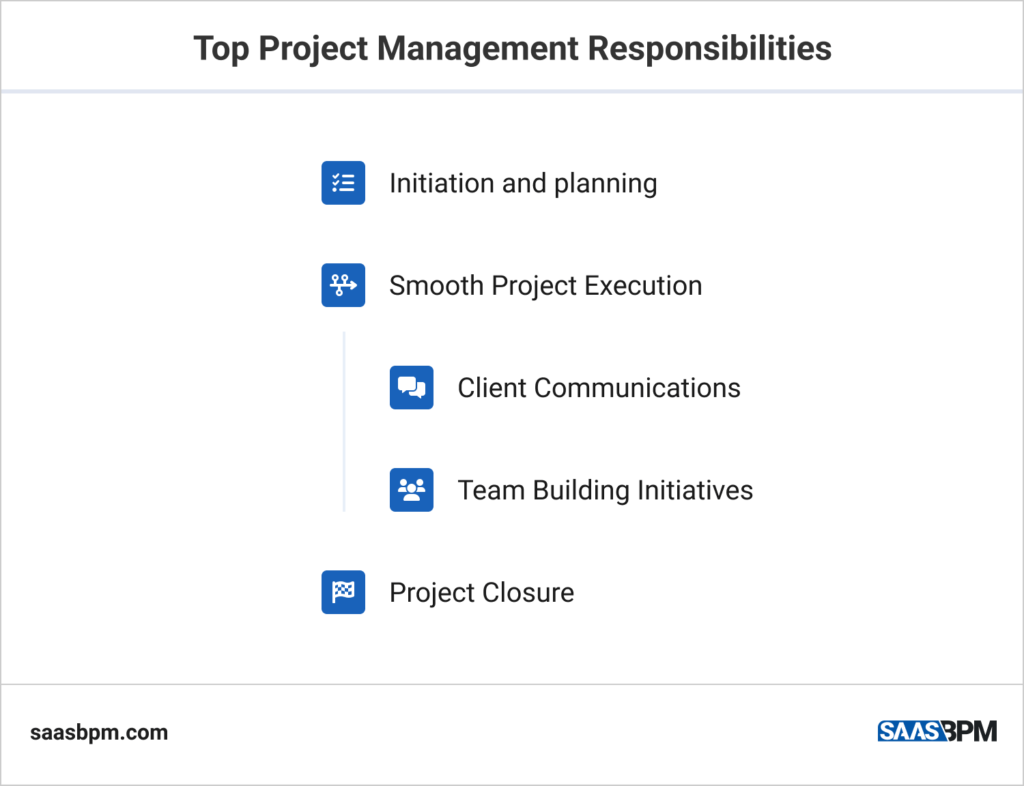Project management responsibilities are about keeping projects on track and on time, usually using a business process management tool. This is essential for your business growth and success. Most of the time, clients expect companies to complete tasks within a certain time frame and achieve a pre-agreed schedule.
In the digital age, and more importantly, in the post-COVID reality, most positions are remote or hybrid. Thus, control over effective time management and deliverables is even more challenging than it was before.
The role of the project manager is to mediate all tasks and projects and coordinate them between different teams and departments. Also, they ensure clear communication with the client and eliminate any discrepancies along the way.
In this article, we will describe the top 3 project management responsibilities in a busy organization.
Key Project Management Responsibilities
The term “project management” refers to the process of beginning, planning, executing, monitoring, controlling, and closing a project. The responsibility of the project manager is to make sure that the project finishes on time, on budget, and exceeds the expectations of stakeholders.
Project managers must be able to solve problems and communicate with both the project team and stakeholders effectively. They must also be capable of effectively managing both risk and change throughout the project’s life cycle.
In a more general sense, project managers are in charge of planning, organizing, and leading the completion of specific projects. They ensure that the team does all activities on time, within budget, and according to plan. Project managers have the ability to direct an organization’s path, lowering expenditures, optimizing company efficiencies, and increasing revenue. This is a result of managing complex projects from start to finish.

Initiation And Planning
The first phase of a project’s life cycle, known as initiation, involves determining the project’s main aims, objective, and scope. Project managers also identify key internal and external stakeholders. In addition, they stablish shared expectations, and obtain the authority to proceed with a project.
Initiating a project entails coming up with a business case or conducting a feasibility study, depending on the complexity of the task. The project manager can begin planning how to execute and track the project after its initiation.
One of the most essential project management responsibilities is to ensure the success of a project with a clear project plan. This outline consists of mapping out activities, risks, contingencies, and alternative routes to success. A clear, comprehensive initial plan can prevent project failure as it serves as a clear roadmap to follow, even in the face of unforeseen obstacles.
Furthermore, planning helps project managers to better allocate resources and identify potential bottlenecks in the project timeline. By taking the time to plan carefully, project managers can increase the chances of achieving their project goals.
Smooth Project Execution

During the project’s execution, the project manager is in charge of making sure that the teams responsible stick to the initial project plan and adhere to the plan and time frame. Project managers assign tasks to team members on a BPM software or other task delegation tool and track their progress. This is necessary to protect the team from distractions, facilitate issue resolution, and lead the team in working through project changes. As a result, the project manager can help the project stay on track and avoid any potential issues.
During project execution, we are frequently called upon to consider a number of variables that might have an impact on the project’s success. Many times, project difficulties may be vague, leaving us to guess what the best answer is.
In these cases, it is often helpful to draw on the creativity of our team members. So, the project manager is a lot of times also responsible for team building initiatives and keeping the enthusiasm of their colleagues on point.
A good project manager knows that they can use competitive pressure to unleash the creative potential of their staff. This way, the team may discover a solution that works for everyone by fostering an entrepreneurial atmosphere. In other words, by embracing ambiguity, we can often find the best path forward.
Preparing The Project for Closure

The project closure phase is the last phase in the project lifecycle, and it officially puts an end to a project. However, the project management responsibilities do not end there. This final process requires meetings and communication with the team and stakeholders, a handful of project documents, and analysis skills.
The project closure phase should be overseen by the same person who dealt with the proposal and development phases. The team will have had a chance to reflect on and improve their procedures, as well as all project papers will be completed.
Take the time to document each and every lesson that you learned throughout the project’s lifecycle. Also, note any changes or modifications that were made so that you may apply them to future projects. Finally, thank your team for their hard work!
Top Project Management Responsibilities: Wrapping Up
The project management responsibilities spread across all aspects of a business. People in this role manage every stage of a project from beginning to end, including team building and client interactions. So, managing a project is no easy feat. Luckily, there are software options like SaaS BPM that can help businesses move through tasks more efficiently and effectively. If you’re looking for a project management tool that considers the human element as well as technology, then look no further!

